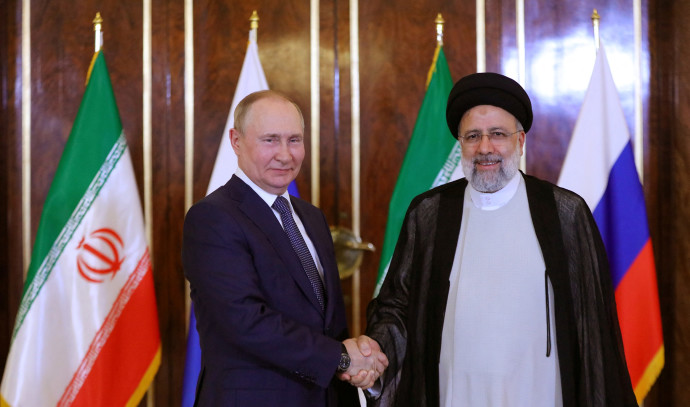As the geopolitical chessboard shifts with seismic repercussions, the recent assault by Iran on Israel on April 13 starkly highlights a pivotal shift in the tectonic plates of global power. The Western powers’ response or, rather, their glaring abstention from this provocation, not only unveils a disturbing trend of reluctance but also underscores a perilous scenario for Arab nations. This hesitancy, rooted in a palpable fear that direct confrontation with Tehran, possibly drawing in Moscow, might escalate into a wider conflagration, casts Arab nations adrift in an increasingly turbulent sea.
At this critical juncture, Arab capitals are not only confronting existential threats at home, but also witnessing the extension of these challenges into their diasporas. The covert colonialism, orchestrated by the alliance between Iran’s regime and Russia, transcends regional boundaries, manifesting as a potent force that seeks to reshape the identities and allegiances of Arab communities worldwide.
This neo-imperialistic influence is particularly pernicious because it operates under the guise of liberating these communities from Western influence. However, in reality, it subtly enforces an agenda that aligns with Tehran’s and Moscow’s strategic interests. This agenda is not merely about gaining political allegiance but about instilling ideologies that are in stark contrast to the traditional values and cultural identities of these communities. Such efforts threaten to erode the historical and cultural essence of the diaspora, effectively redefining the identity of these communities from afar.
The implications of losing control over their diasporas are profound for Arab capitals. The diaspora often acts as a cultural and economic bridge back to the homeland; its potential realignment could not only shift the international perception and political stance of these communities but could also influence domestic politics within the Arab states themselves. As the Islamic Revolutionary Guard Corps (IRGC) and Moscow continue to engineer societal changes both within the region and in the diaspora, the risk is that these communities may become conduits for foreign agendas that are at odds with the interests and security of their countries of origin.
Diaspora influence
The phenomenon extends the sphere of influence of Iran and Russia, creating pockets of influence in places far removed from their geographical boundaries. This strategy of soft power extends beyond simple propaganda, leveraging cultural, social, and political tools to weave their narratives tightly into the fabric of these communities, often capitalizing on feelings of displacement, alienation, or dissent against perceived Western imperialism.
Arab capitals, therefore, face the urgent task of reinforcing their ties with their diasporas, ensuring that these communities remain connected to their cultural roots and aligned with their national interests. This involves not only countering the narratives posed by the IRGC and Moscow but also providing supportive community networks that can offer credible alternatives to the allure of these foreign influences.
The challenge is significant, but the stakes are too high to ignore. Arab states must engage actively with their diasporas, fostering a sense of unity and shared destiny that can withstand the pressures of external manipulation. This effort requires a sophisticated understanding of the diaspora’s dynamics and an inclusive approach that addresses the diverse needs and aspirations of these communities.
Amid this shifting landscape, the inertia of Western foreign policy, driven by a reluctance to escalate conflicts and a dread of losing influence—particularly as nations in Western Africa, like Niger, pivot towards Moscow and Tehran—signals a disconcerting decline in Western resolve and power. This poses a substantial challenge for Arab states, whose security and territorial integrity can no longer rely solely on the faltering assurances of traditional Western alliances.
Thus arises the urgent imperative for Arab nations to liberate themselves, or rather emancipate themselves, from an indecisive West. Saudi Arabia, under the assertive stewardship of Crown Prince Mohammed Bin Salman, finds itself uniquely positioned to assert significant global influence. The kingdom is poised to offer a formidable counter to Tehran’s aggressive ambitions, both territorial and ideological. As Western influence wanes, Saudi Arabia’s role becomes crucial in stabilizing the region and offering a counterbalance to the Islamic Republic of Iran’s overreach.
NEEDLESS TO SAY, the State of Israel remains a crucial actor within these evolving dynamics. It is imperative to recognize that the hostilities directed against Israel have been meticulously engineered by Tehran to advance its strategic agenda, perpetuating a conflict that serves neither the interests nor the well-being of the region. The protective stance taken by Saudi Arabia and Jordan against the IRGC’s aerial onslaughts marks a slow yet significant shift in regional consciousness, recognizing the manipulative tactics at play. This awareness underscores the pressing need to fortify alliances like never before.
Saudi Arabia’s vision of transforming into a dynamic, modernizing force could galvanize other Arab nations to coalesce around a unified strategy to safeguard their collective interests. By harnessing its economic, political, and military prowess, Saudi Arabia can lead initiatives that fortify Arab unity and resilience. This could manifest in enhanced military cooperation, strategic economic agreements, and diplomatic alliances that extend well beyond the Arab sphere, including global powers keen on preserving regional stability and curtailing Iran’s influence.
As the West retreats from its historical geopolitical responsibilities, the onus falls squarely on regional powers like Saudi Arabia and Israel to advance. Their leadership can catalyze support and cultivate a coalition of nations ready to confront the dual threats of military aggression and ideological encroachment posed by Iran and its allies. In doing so, these nations not only protect their own interests but also contribute to a broader effort to maintain equilibrium and peace in an increasingly multipolar world.
The urgency of such action is paramount. Arab nations, along with Israel, must swiftly recognize and adapt to the shifting dynamics. The era of relying solely on Western guarantees for security and stability has elapsed; the future demands a proactive, assertive approach that these states, guided by visionary leadership, are amply equipped to pursue.
The writer is executive director of the Forum for Foreign Relations (FFR).







